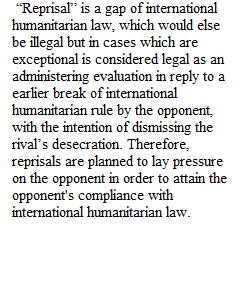


Q 1. A. What is meant by “reprisals”? What is relevance of this concept of “reprisal” with the jus in bello rules? Discuss the details of Example #3 to show why the issue of reprisal is a controversial issue. (10 points) 1. B. Explain fully and clearly the view of Sheldon Cohen about this Example #3. For Cohen, what are the two obligations that can override the duty that belligerents are not to harm prisoners of war? Explain fully the position taken by Cohen with regard to these 2 obligations. (15 points)1. C. What is the position taken by Christopher (the author of our book) on the analysis of Cohen of this Example #3? (15 points)2. A. Explain fully and clearly the position of Michael Walzer about reprisals. In the case of Example #3, what does Walzer say about Cohen’s analysis of Example #3? Given that view of Walzer, does he have an alternative to offer in regard to the issue involved in Example #3? If so, what is that alternative method? Explain fully your answer. (15 points) B. Are there cases in which reprisals might legitimately be conducted? If so, under what conditions or criteria would the resort to reprisals be justified? When may a nation then invoke the doctrine of reprisals? Explain fully your answer. (15 points)3. A. Explain the absolutist argument for the jus in bello principles as it applies to the issue of military necessity. What is the position of Thomas Nagel on the issue of military necessity? For Nagel, is there a justification for intentionally setting aside the principles of jus in bello? Explain fully your answer. (15 points)
View Related Questions